Another month has come and gone. For readers, that means that publishers have released another batch of books. I am in the happy position of receiving most of them, so sorted through the various stacks to arrive at this list of new and notables. In each case, I’ve included the editorial description so you can get a sense of what the book is all about. I hope there’s something here that stands out to you!
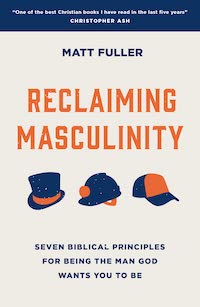 Reclaiming Masculinity: Seven Biblical Principles for Being the Man God Wants You to Be by Matt Fuller. “In a world where masculinity is often associated with toxicity, what does it mean to ‘be a man’? In a straightforward and empathetic way, Matt Fuller gets beyond cultural confusion and stereotypes as he examines what the Bible says is distinctive about being a man. He outlines a positive vision of biblical masculinity and shows what that might look like in real life today. Men will be encouraged to be sacrificial when leading, to work hard and to protect and invest in others. Whatever your personality and interests—whether you would rather skin a rabbit, read a book or remodel your house—this book will give you confidence and direction to be the man God wants you to be.” (Buy it at Amazon or Westminster Books)
Reclaiming Masculinity: Seven Biblical Principles for Being the Man God Wants You to Be by Matt Fuller. “In a world where masculinity is often associated with toxicity, what does it mean to ‘be a man’? In a straightforward and empathetic way, Matt Fuller gets beyond cultural confusion and stereotypes as he examines what the Bible says is distinctive about being a man. He outlines a positive vision of biblical masculinity and shows what that might look like in real life today. Men will be encouraged to be sacrificial when leading, to work hard and to protect and invest in others. Whatever your personality and interests—whether you would rather skin a rabbit, read a book or remodel your house—this book will give you confidence and direction to be the man God wants you to be.” (Buy it at Amazon or Westminster Books)
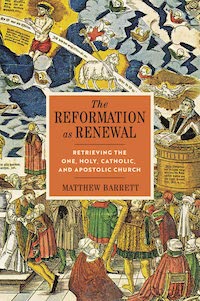 The Reformation as Renewal: Retrieving the One, Holy, Catholic, and Apostolic Church by Matthew Barrett. “In the sixteenth century Rome charged the Reformers with novelty, as if they were heretics departing from the catholic (universal) church. But the Reformers believed they were more catholic than Rome. Distinguishing themselves from Radicals, the Reformers were convinced they were retrieving the faith of the church fathers and the best of the medieval Scholastics. The Reformers saw themselves as faithful stewards of the one, holy, catholic, and apostolic church preserved across history, and they insisted on a restoration of true worship in their own day. By listening to the Reformers’ own voices, The Reformation as Renewal helps readers explore: The Reformation’s roots in patristic and medieval thought and its response to late medieval innovations; Key philosophical and theological differences between Scholasticism in the High Middle Ages and deviations in the Late Middle Ages; The many ways sixteenth and seventeenth century Protestant Scholastics critically appropriated Thomas Aquinas; The Reformation’s response to the charge of novelty by an appeal to the Augustinian tradition; Common caricatures that charge the Reformation with schism or assume the Reformation was the gateway to secularism; The spread of Reformation catholicity across Europe, as seen in first and second-generation leaders from Luther and Melanchthon in Wittenberg to Zwingli and Bullinger in Zurich to Bucer and Calvin in Strasbourg and Geneva to Tyndale, Cranmer, and Jewel in England, and many others; The theology of the Reformers, with special attention on their writings defending the catholicity of the Reformation.” (Buy it at Amazon or Westminster Books)
The Reformation as Renewal: Retrieving the One, Holy, Catholic, and Apostolic Church by Matthew Barrett. “In the sixteenth century Rome charged the Reformers with novelty, as if they were heretics departing from the catholic (universal) church. But the Reformers believed they were more catholic than Rome. Distinguishing themselves from Radicals, the Reformers were convinced they were retrieving the faith of the church fathers and the best of the medieval Scholastics. The Reformers saw themselves as faithful stewards of the one, holy, catholic, and apostolic church preserved across history, and they insisted on a restoration of true worship in their own day. By listening to the Reformers’ own voices, The Reformation as Renewal helps readers explore: The Reformation’s roots in patristic and medieval thought and its response to late medieval innovations; Key philosophical and theological differences between Scholasticism in the High Middle Ages and deviations in the Late Middle Ages; The many ways sixteenth and seventeenth century Protestant Scholastics critically appropriated Thomas Aquinas; The Reformation’s response to the charge of novelty by an appeal to the Augustinian tradition; Common caricatures that charge the Reformation with schism or assume the Reformation was the gateway to secularism; The spread of Reformation catholicity across Europe, as seen in first and second-generation leaders from Luther and Melanchthon in Wittenberg to Zwingli and Bullinger in Zurich to Bucer and Calvin in Strasbourg and Geneva to Tyndale, Cranmer, and Jewel in England, and many others; The theology of the Reformers, with special attention on their writings defending the catholicity of the Reformation.” (Buy it at Amazon or Westminster Books)
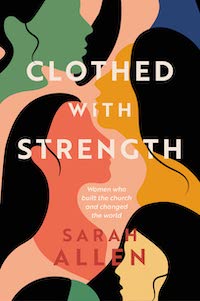 Clothed With Strength: Women Who Built the Church and Changed the World by Sarah Allen. “It’s easy to imagine that Christian women of the past were shrinking violets who were side-lined and excluded from making a difference in the church and in the world. The truth is that God has always raised up strong and courageous women to do his work. You might never have heard of Rebecca Protten, Hannah More, Ellen Raynard and Josephine Butler, but you’ll never forget how God used these four very different women to fight against injustice and poverty and to transform lives. These eighteenth and nineteenth century women worked in partnership with men to shape the evangelical church. Let their stories challenge you and fuel your faith today.” (Buy it at Amazon or Westminster Books)
Clothed With Strength: Women Who Built the Church and Changed the World by Sarah Allen. “It’s easy to imagine that Christian women of the past were shrinking violets who were side-lined and excluded from making a difference in the church and in the world. The truth is that God has always raised up strong and courageous women to do his work. You might never have heard of Rebecca Protten, Hannah More, Ellen Raynard and Josephine Butler, but you’ll never forget how God used these four very different women to fight against injustice and poverty and to transform lives. These eighteenth and nineteenth century women worked in partnership with men to shape the evangelical church. Let their stories challenge you and fuel your faith today.” (Buy it at Amazon or Westminster Books)
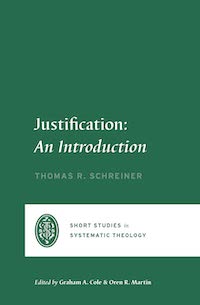 Justification: An Introduction (Short Studies in Systematic Theology) by Thomas Schreiner. “When we see the fallenness of the world, it is often challenging to understand how sinners can stand before a holy God, but the gospel gives hope—justification that comes through Jesus Christ. This doctrine is essential to the gospel but has sparked countless academic and theological disagreements throughout church history, even contributing to the Protestant Reformation in the sixteenth century. In this addition to the Short Studies in Systematic Theology series, Thomas R. Schreiner examines the biblical and historical background of the doctrine of justification. Schreiner explores it throughout church history and analyzes both the Old and New Testament teachings. By examining the relationship between justification and other doctrines of salvation—such as redemption, reconciliation, adoption, and sanctification—Schreiner shows how it gives peace, assurance, and joy to sinners through Jesus and hope for life today.” (Buy it at Amazon or Westminster Books)
Justification: An Introduction (Short Studies in Systematic Theology) by Thomas Schreiner. “When we see the fallenness of the world, it is often challenging to understand how sinners can stand before a holy God, but the gospel gives hope—justification that comes through Jesus Christ. This doctrine is essential to the gospel but has sparked countless academic and theological disagreements throughout church history, even contributing to the Protestant Reformation in the sixteenth century. In this addition to the Short Studies in Systematic Theology series, Thomas R. Schreiner examines the biblical and historical background of the doctrine of justification. Schreiner explores it throughout church history and analyzes both the Old and New Testament teachings. By examining the relationship between justification and other doctrines of salvation—such as redemption, reconciliation, adoption, and sanctification—Schreiner shows how it gives peace, assurance, and joy to sinners through Jesus and hope for life today.” (Buy it at Amazon or Westminster Books)
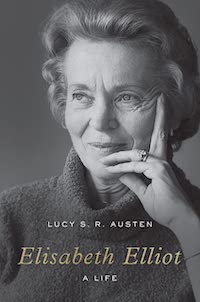 Elisabeth Elliot: A Life by Lucy S.R. Austen. “Elisabeth Elliot (1926-2015) is one of the most widely known Christians of the twentieth and twenty-first centuries. After the death of her husband, Jim, and four other missionaries at the hands of Waorani tribesmen in Ecuador, Elliot famously returned to live among the same people who had killed her husband. Her legacy, however, extends far beyond these events. In the years that followed, Elliot became a prolific writer and speaker, touching the lives of countless people around the world. In this single-volume biography, Lucy S. R. Austen takes readers on an in-depth journey through the life of Elisabeth Elliot—her birth to missionary parents, her courtship and marriage to Jim Elliot, her missions work in Ecuador, and her private life and public work after she returned to the United States. Through Elliot’s example of love for God and obedience to his commands, readers will ponder what it means to follow Jesus.” (Buy it at Amazon or Westminster Books)
Elisabeth Elliot: A Life by Lucy S.R. Austen. “Elisabeth Elliot (1926-2015) is one of the most widely known Christians of the twentieth and twenty-first centuries. After the death of her husband, Jim, and four other missionaries at the hands of Waorani tribesmen in Ecuador, Elliot famously returned to live among the same people who had killed her husband. Her legacy, however, extends far beyond these events. In the years that followed, Elliot became a prolific writer and speaker, touching the lives of countless people around the world. In this single-volume biography, Lucy S. R. Austen takes readers on an in-depth journey through the life of Elisabeth Elliot—her birth to missionary parents, her courtship and marriage to Jim Elliot, her missions work in Ecuador, and her private life and public work after she returned to the United States. Through Elliot’s example of love for God and obedience to his commands, readers will ponder what it means to follow Jesus.” (Buy it at Amazon or Westminster Books)
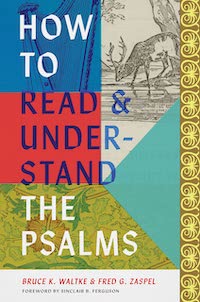 How to Read and Understand the Psalms by Fred Zaspel and Bruce Waltke. “Written over the course of 1,000 years, the book of Psalms is a collection of religious poetry voicing a wide variety of human emotions expressed in different genres–imprecatory psalms, psalms of praise, and more. It has become one of the most popular books of the Bible, but most readers have only a surface level understanding of the Psalms and how it fits into the larger historical and scriptural context. In How to Read and Understand the Psalms, Bruce K. Waltke and Fred G. Zaspel give readers tools to learn how to properly interpret and internalize the Psalms. Developed primarily from decades of lectures by Waltke, they explain the various types of psalms, Hebrew poetry, rhetorical techniques, and more. Armed with these tools, believers will discover how the 150 psalms can further fuel their knowledge and love of God.” (Buy it at Amazon or Westminster Books)
How to Read and Understand the Psalms by Fred Zaspel and Bruce Waltke. “Written over the course of 1,000 years, the book of Psalms is a collection of religious poetry voicing a wide variety of human emotions expressed in different genres–imprecatory psalms, psalms of praise, and more. It has become one of the most popular books of the Bible, but most readers have only a surface level understanding of the Psalms and how it fits into the larger historical and scriptural context. In How to Read and Understand the Psalms, Bruce K. Waltke and Fred G. Zaspel give readers tools to learn how to properly interpret and internalize the Psalms. Developed primarily from decades of lectures by Waltke, they explain the various types of psalms, Hebrew poetry, rhetorical techniques, and more. Armed with these tools, believers will discover how the 150 psalms can further fuel their knowledge and love of God.” (Buy it at Amazon or Westminster Books)
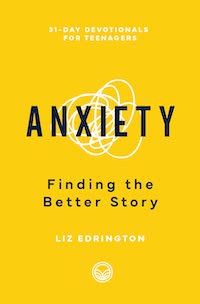 Anxiety: Finding the Better Story (31-Day Devotionals for Teenagers) by Liz Edrington. “Have you ever stood in front of an ocean wave, put your hand out in front of you, and said, ‘Stop, wave!?’ That would be ridiculous! … But have you ever tried the same approach with your anxiety? ‘Stop, anxiety!’ It probably hasn’t worked either. Liz gets it. As a teenager, she was stressed out and trying to survive her anxiety each day. Now that she’s a mental health counselor, she wants to pass on what she’s learned to other teenagers. Just understanding what anxiety is makes a big difference, but what makes an even bigger difference is understanding what God has to say about it. With daily Scripture readings, breathing exercises, and additional mental-health resources, this little book offers you comfort and help in your anxiety. See how your anxiety fits into the big story of your life—and of the whole universe–and learn how Jesus can bring you peace.” (Buy it at Amazon or Westminster Books)
Anxiety: Finding the Better Story (31-Day Devotionals for Teenagers) by Liz Edrington. “Have you ever stood in front of an ocean wave, put your hand out in front of you, and said, ‘Stop, wave!?’ That would be ridiculous! … But have you ever tried the same approach with your anxiety? ‘Stop, anxiety!’ It probably hasn’t worked either. Liz gets it. As a teenager, she was stressed out and trying to survive her anxiety each day. Now that she’s a mental health counselor, she wants to pass on what she’s learned to other teenagers. Just understanding what anxiety is makes a big difference, but what makes an even bigger difference is understanding what God has to say about it. With daily Scripture readings, breathing exercises, and additional mental-health resources, this little book offers you comfort and help in your anxiety. See how your anxiety fits into the big story of your life—and of the whole universe–and learn how Jesus can bring you peace.” (Buy it at Amazon or Westminster Books)
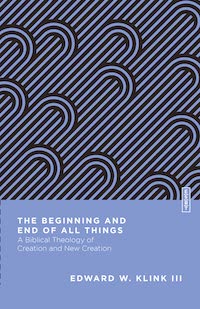 The Beginning and End of All Things: A Biblical Theology of Creation and New Creation by Edward Klink III. “Many Christians think of the doctrine of creation primarily as relating to the world’s origins. In The Beginning and End of All Things, Edward W. Klink III presents a more holistic understanding of creation–a story that is unfolded throughout all of Scripture and is at the core of the gospel itself. From beginning to end, the theme of creation and new creation not only directs the movement of the entire biblical story but also unifies its message. Klink explores the goodness of the physical world and how it will be perfected in the new creation of heaven and earth. Along with offering rich insights about God and his purposes for the world, a biblical theology of creation guides how we engage nature, culture, and life as embodied beings. Essential Studies in Biblical Theology (ESBT), edited by Benjamin L. Gladd, explore the central or essential themes of the Bible’s grand storyline. Taking cues from Genesis 1-3, authors trace the presence of these themes throughout the entire sweep of redemptive history. Written for students, church leaders, and laypeople, the ESBT offers an introduction to biblical theology.” (Buy it at Amazon or Westminster Books)
The Beginning and End of All Things: A Biblical Theology of Creation and New Creation by Edward Klink III. “Many Christians think of the doctrine of creation primarily as relating to the world’s origins. In The Beginning and End of All Things, Edward W. Klink III presents a more holistic understanding of creation–a story that is unfolded throughout all of Scripture and is at the core of the gospel itself. From beginning to end, the theme of creation and new creation not only directs the movement of the entire biblical story but also unifies its message. Klink explores the goodness of the physical world and how it will be perfected in the new creation of heaven and earth. Along with offering rich insights about God and his purposes for the world, a biblical theology of creation guides how we engage nature, culture, and life as embodied beings. Essential Studies in Biblical Theology (ESBT), edited by Benjamin L. Gladd, explore the central or essential themes of the Bible’s grand storyline. Taking cues from Genesis 1-3, authors trace the presence of these themes throughout the entire sweep of redemptive history. Written for students, church leaders, and laypeople, the ESBT offers an introduction to biblical theology.” (Buy it at Amazon or Westminster Books)
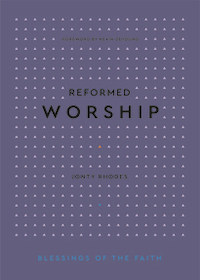 Reformed Worship by Jonty Rhodes. “Have you ever woken up on a Sunday morning and wondered if it was worth getting out of bed? Have you wondered why you should bother to attend corporate worship every week? Unfortunately, it can be easy to miss the excitement of corporate worship–but the excitement is there. Because God is all-sufficient, he commands worship for his glory but our gain! A Reformed view of worship is shaped by God’s Word and has the gospel as its context: God desires to meet with his people, and that meeting comes only in and through Christ, by the Holy Spirit. Jesus is our worship leader, and as our prophet, priest and king he teaches us what worship should look like. Writing with winsome enthusiasm, Jonty Rhodes celebrates the simplicity and freedom of Reformed worship and shows readers the joys of meeting with God in the means and manner he promises to bless.” (Buy it at Amazon or Westminster Books)
Reformed Worship by Jonty Rhodes. “Have you ever woken up on a Sunday morning and wondered if it was worth getting out of bed? Have you wondered why you should bother to attend corporate worship every week? Unfortunately, it can be easy to miss the excitement of corporate worship–but the excitement is there. Because God is all-sufficient, he commands worship for his glory but our gain! A Reformed view of worship is shaped by God’s Word and has the gospel as its context: God desires to meet with his people, and that meeting comes only in and through Christ, by the Holy Spirit. Jesus is our worship leader, and as our prophet, priest and king he teaches us what worship should look like. Writing with winsome enthusiasm, Jonty Rhodes celebrates the simplicity and freedom of Reformed worship and shows readers the joys of meeting with God in the means and manner he promises to bless.” (Buy it at Amazon or Westminster Books)
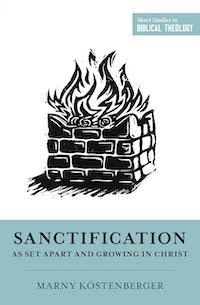 Sanctification as Set Apart and Growing in Christ by Margaret Elizabeth Köstenberger. “The entire biblical narrative declares the righteousness of God and the consecration of his people. In this book, Marny Köstenberger explores the topic of sanctification―being set apart by God for holiness. Surveying the Bible from beginning to end, Köstenberger shows that sanctification is grounded in the eternal holiness of God, who created humanity in his image. Now, in Christ, the Spirit sets believers apart and restores them to the original image. Sanctification often takes place in the midst of suffering and equips believers for their God-given mission.” (Buy it at Amazon or Westminster Books)
Sanctification as Set Apart and Growing in Christ by Margaret Elizabeth Köstenberger. “The entire biblical narrative declares the righteousness of God and the consecration of his people. In this book, Marny Köstenberger explores the topic of sanctification―being set apart by God for holiness. Surveying the Bible from beginning to end, Köstenberger shows that sanctification is grounded in the eternal holiness of God, who created humanity in his image. Now, in Christ, the Spirit sets believers apart and restores them to the original image. Sanctification often takes place in the midst of suffering and equips believers for their God-given mission.” (Buy it at Amazon or Westminster Books)
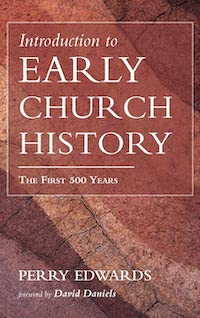 Introduction to Early Church History: The First 500 Years by Perry Edwards. “As an introduction to early church history, this book is not intended to cover any subject exhaustively. Its goal is to provide an overview of the most significant leaders of the church while adding stories of ordinary Christians who remained faithful to the Lord in the face of persecution. It will introduce readers to how the church, in its first five centuries, sought to answer the primary theological questions of the day. This book is meant to whet the appetite of those who have never read early church history and refresh the minds of those who have. For some, the reading of this book will be the beginning of a journey that will lead to a deep and abiding love for the history of God’s sovereign working in the church and in the world.” (Buy it at Amazon)
Introduction to Early Church History: The First 500 Years by Perry Edwards. “As an introduction to early church history, this book is not intended to cover any subject exhaustively. Its goal is to provide an overview of the most significant leaders of the church while adding stories of ordinary Christians who remained faithful to the Lord in the face of persecution. It will introduce readers to how the church, in its first five centuries, sought to answer the primary theological questions of the day. This book is meant to whet the appetite of those who have never read early church history and refresh the minds of those who have. For some, the reading of this book will be the beginning of a journey that will lead to a deep and abiding love for the history of God’s sovereign working in the church and in the world.” (Buy it at Amazon)
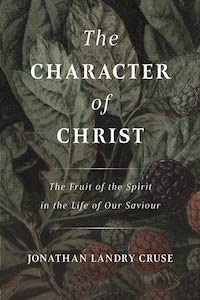 The Character of Christ: The Fruit of the Spirit in the Life of Our Saviour by Jonathan Landry Cruse. “Most experienced Christians are familiar with the fruit of the Spirit listed in Galatians. Love, peace, patience, and so on are often considered both gracious marks of true Christian character and ideals to aim for. But what do they look like when lived to the fullest? This book answers this question by studying the fullness of the fruit of the Spirit in the life of Christ. In a warm and engaging style, Jonathan Landry Cruse examines these godly attributes in the Lord’s example, comparing them with our own faltering efforts at holiness, and shows that we can only bear true fruit for God by our union to the life-giving Vine. The work is God’s, not ours – and this is good news for all those who yearn for greater sanctification.” (Buy it at Amazon)
The Character of Christ: The Fruit of the Spirit in the Life of Our Saviour by Jonathan Landry Cruse. “Most experienced Christians are familiar with the fruit of the Spirit listed in Galatians. Love, peace, patience, and so on are often considered both gracious marks of true Christian character and ideals to aim for. But what do they look like when lived to the fullest? This book answers this question by studying the fullness of the fruit of the Spirit in the life of Christ. In a warm and engaging style, Jonathan Landry Cruse examines these godly attributes in the Lord’s example, comparing them with our own faltering efforts at holiness, and shows that we can only bear true fruit for God by our union to the life-giving Vine. The work is God’s, not ours – and this is good news for all those who yearn for greater sanctification.” (Buy it at Amazon)









